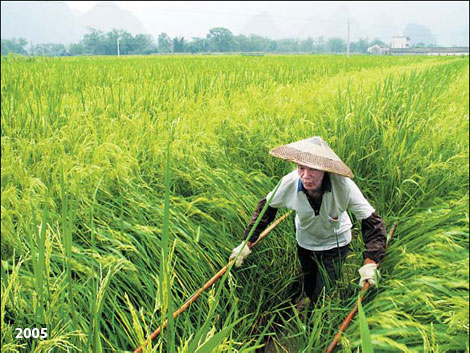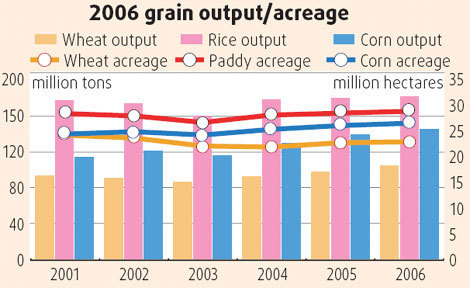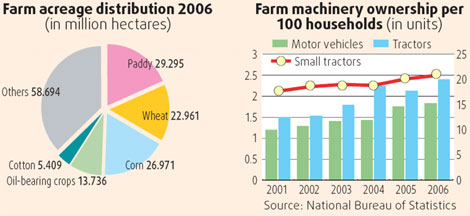
|
BIZCHINA> Editor Choice
 |
|
Related
Endless, ancient toil
By YOU NUO (China Daily)
Updated: 2008-07-14 15:07

The two photos in our column this week have a difference of 20 years - the black-and-white one taken in 1985 while the color one is from 2005. For most economies in the world, 20 years don't usually show much difference. But for Chinese farmers, they are a world apart. Growing rice used to be a family affair, an intensive operation that frequently required at least several people to play different roles. This had been the case for eons (archeologists say people might have grown rice 7,000 years ago in some spots in the Yangtze valley).
But the practice, as we can see from the 1985 photo, lasted well into the 1980s in many parts of the country. From time to time, especially during harvest, the whole family would be working in the fields. Even the young kids were asked to run some errands. There was nothing idyllic about it. For families short of labor, teenagers dropping out of school was almost a matter of course - and the consequences, as can be easily imagined, would severely limit their opportunities to find a life beyond the countryside. Urban-based educators used to wonder, not so long ago, when the farmers could be liberated by machines or by something else, from so much work in the fields, so that their children could go to school and prepare for more creative jobs. A change has become widespread since the beginning of the 2000s. Urban jobs (sometimes disparaged as sweatshop pay in developed countries) have proved so attractive to rural youths that increasing numbers of them are leaving the paddy fields to work in the cities. The scene of a whole family working (and virtually living) in the fields is no longer commonplace. Attending the paddy is more often a lonely operation. Even in busy times, farmers just borrow (they do not usually say "buy") services from each other, in order to harvest the crops, to use farm machinery, and to build irrigation systems. These services are paid in part by the remittances from their children working in the distant cities. So far so good, it seems. But for agricultural specialists, this is by no means a secure system. Farming in China still has a long way to go to become truly modernized and efficient. Feeding more than one-fifth of the world's population still remains a challenge. As can be seen from one of our charts, private ownership of farm machinery is still low in Chinese countryside. And that amount of machine power has sustained the nation's grain output for so long. Chinese economists are anxiously waiting for new data showing the growing productivity of farmers.
  (For more biz stories, please visit Industries)
|